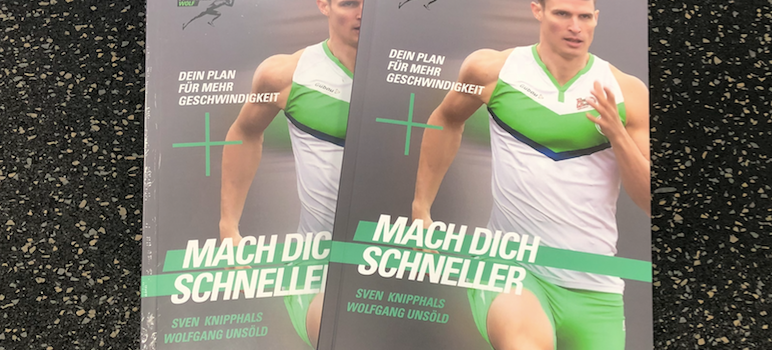3 weeks ago the "Make yourself faster" book by Sven Knipphals and Wolfgang Unsöld including a training program on the track and in the weight room as well as sprint-specific mobility exercises and a chapter on optimizing nutrition.
The aim of the book is to give hobby and amateur athletes an insight into the training of a sprinter and at the same time provide a program that anyone can incorporate into their own training with 2 to 4 units per week to get faster.
Sven is one of the fastest German 100m sprinters in history, has been to the Olympics twice and has won multiple medals at the European Championships.
To give a deeper insight into the book and the background, here is a short interview with Sven:
What is the intention behind your book? What was important to you personally?
Sven: The idea actually came to me after a meeting in the disco, when a soccer player approached me in a cheerful party mood and said, "Hey, you're the Knipphals! I'll knock you out over 100m." That wasn't the only one who, in the heat of the moment, wanted to compete with me over 100m to show that he could easily knock me out. But this statement finally made me write down my experiences from sprinting. The book wasn't planned at the beginning. Over time, however, one or the other knowledge came together, so that it made sense to go into more detail on the topic of 'speed' from different points of view and to record it in a book. Personally, it was important to me that I give practical tips, so that everyone can really see how they can work on their speed.
What is it about in two or three sentences?
Sven: Everyone gets the chance to get the most out of their sprint performance as efficiently and concisely as possible. So especially everyone who doesn't already run 10.5 seconds for 100m or is more at home in a marathon. But everyone who moves in between can win and implement a personal incentive for their own speed.
Which target group are you addressing? Who should buy the book?
Sven: In the beginning it was planned for the classic 'soccer district league Ronaldo', but anyone who wants to work on their speed can benefit from the tips. Your own speed can be integrated into different training specifics and can help there. But also the knowledge around it, i.e. what your own speed requires (whether an adapted diet or the physical requirements) are informative and instructive.
With whom/what help was the book created?
Sven: In cooperation with Wolfang Unsöld, Strength and Personal Coach from Stuttgart, who has already made a name for himself on an international level, and Ingo Bartels from TalentEntdecker, who took over the editing and marketing. I myself wrote the sprint part and the plans.
How much Sven (as a person and athlete) is in the book?
Sven: I don't think you can really separate them, or I would almost say that the chiropractor even had the most say. However, the book reflects my style in a certain way, i.e. how I approach things: partly obsessed with detail but also briefly and concisely getting to the point.
Which sporting and professional experiences as a chiropractor are included in the book?
Sven: The sporting experience is of course the practical experience on which everything else is based. The key points here are that you shouldn’t overdo it as a sprinter or when sprinting – intensity is the keyword. That means: 100x100m is nonsense but already 9x60m is already really on the substance. It may not sound like much, but if you mobilize everything that can be called up in terms of strength over 60m, then such training is very exhausting. You can only improve your ability to sprint if you use a sensible stimulus during training, although you should not overdo it either.
The chiropractor had a hand in particular when it came to the physical requirements.
If you had to name three points, what is important when it comes to speed?
- Continuity: running fast is not enough
- Straightforwardness: the forces must be directed forward
- Sprinting comes from sprinting
What requirements should you bring with you?
Sven: We tried to make the book as broad as possible. On the other hand, if you haven't done anything for a long time or are more in the extreme endurance range, the book is of course less suitable for you. But the part about nutrition can be interesting for everyone (keyword regeneration). But if you really want to get a training benefit from the book, you should already have a basic level of fitness.
Is there anything you would do differently looking back today? Especially with all the practical knowledge you have acquired?
Sven: Basically not much. The only thing I couldn't do justice to was the absolute consistency in terms of performance-oriented training because I was studying and later working at the same time - but ultimately everyone has to see where they are and how they get along as an athlete. I might have wanted to train in an even more professional environment, but that didn't happen and you couldn't influence that much at the same time. The circumstances were as they were and we still made the best of it. That's why I can and am satisfied with what came out of it. Of course you can tweak a few facets here and there afterwards, but in the end all these ups and downs, all experiences make us stronger and the person/athlete that we are.
This is exactly what training means: development! And this is characterized by ups and downs and it rarely goes straight ahead. It takes tireless effort, self-confidence and genuine passion to achieve your goals. A time that brings with it emotions, experiences, knowledge and insights and which in turn shape. And all of this in turn makes success on day X tangible and comprehensible.
How do you feel when you hold your book in your hands? Are memories awakening, melancholy rising or is it just the beginning of a new chapter (literally)?
Sven: Of course I was very happy when I held the book in my hands - even if the last few weeks were very exhausting and I read the book umpteen times and by the end I was almost blind. But it was worth it and I'm looking forward to the feedback that comes back now. And yes, this is literally a new chapter, but I'm looking forward to it.
That's probably in the nature of an athlete: you don't want to stand still or stagnate.
Despite ending his active career as a sprinter, Sven is still involved in sprinting, because he supervises the training group of DLV national coach Ronald Stein in athletics and strength training and takes over the therapy as a chiropractor. In this way, Sven can review at the same time how he once experienced and practiced it as a sprinter and can in turn incorporate this into his work/supervision.
The original of the interview can be found here
The "Make yourself faster" book can be ordered directly here as a print book or e-book .
Image: The Make You Faster Book .

